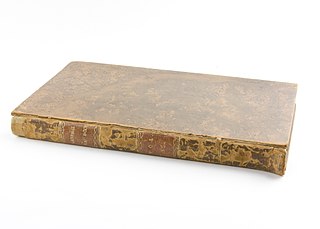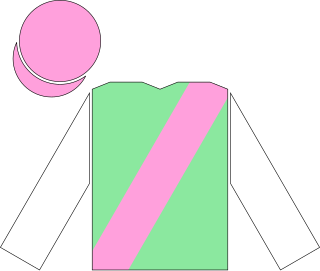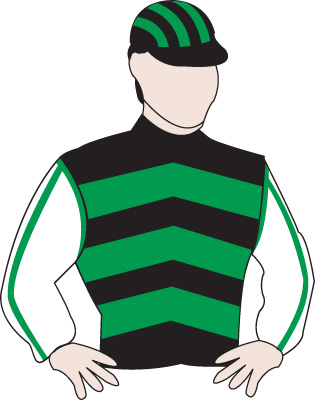
Thoroughbred horse racing is a spectator sport in Australia, and gambling on horse races is a very popular pastime with A$14.3 billion wagered in 2009/10 with bookmakers and the Totalisator Agency Board (TAB). The two forms of Thoroughbred horseracing in Australia are flat racing, and races over fences or hurdles in Victoria and South Australia. Thoroughbred racing is the third most attended spectator sport in Australia, behind Australian rules football and rugby league, with almost two million admissions to 360 registered racecourses throughout Australia in 2009/10. Horseracing commenced soon after European settlement, and is now well-appointed with automatic totalizators, starting gates and photo finish cameras on nearly all Australian racecourses.
Flower Alley is an American Thoroughbred racehorse and sire. Winner of the Travers Stakes during his racing career, he is best known as the sire of 2012 Kentucky Derby and Preakness Stakes winner I'll Have Another.

WinStar Farm is an American Thoroughbred horse breeding and racing farm near Versailles, Kentucky, owned by Kenny Troutt. It won the 2010 Eclipse Award for Outstanding Owner and 2016 Outstanding Breeder. WinStar Farm owned 2018 Triple Crown winner Justify, 2010 Kentucky Derby winner Super Saver, 2010 Belmont Stakes winner Drosselmeyer, and 2016 Belmont Stakes winner Creator. Notable stallions that have stood at stud at Winstar Farm include two-time Breeders' Cup Classic winner Tiznow, leading sire and broodmare sire Distorted Humor, and Triple Crown and Breeders' Cup Classic winner American Pharoah's sire Pioneerof the Nile.
Northern Taste was a Canadian-bred Thoroughbred racehorse who raced in France and who became one of the most successful and influential leading sires in Japanese racing history.

The Thoroughbred is a horse breed developed for horse racing. Although the word thoroughbred is sometimes used to refer to any breed of purebred horse, it technically refers only to the Thoroughbred breed. Thoroughbreds are considered "hot-blooded" horses that are known for their agility, speed, and spirit.

Raven's Pass is an American-bred, British-trained Thoroughbred racehorse most notable for being the first English-trained winner of the Grade I Breeders' Cup Classic at Santa Anita Park in Arcadia, California.

Kingfisher (1867–1890) was an American Thoroughbred racehorse who won the 1870 Belmont Stakes.

The Jersey Act was a regulation introduced to prevent the registration of most American-bred Thoroughbred horses in the British General Stud Book. It had its roots in the desire of British horse breeders to halt the influx of American-bred racehorses of possibly impure bloodlines during the early 20th century. Many American-bred horses were exported to Europe to race and retire to a breeding career after a number of U.S. states banned gambling, which depressed Thoroughbred racing—and thus breeding—in the United States. The loss of breeding records during the American Civil War and the late beginning of the registration of American Thoroughbreds led many in the British racing establishment to doubt that the American-bred horses were purebred.
Thoroughbred valuation is the art of determining the value or potential value of a Thoroughbred horse, particularly of race horses.

Luke McLuke was a bay Thoroughbred stallion born in the United States. He won the 1914 Belmont Stakes, the Carlton Stakes, Kentucky Handicap, and Grainger Memorial Handicap among his four wins from six starts. After his racing career was over, he became a breeding stallion, siring 11 stakes winners. Two of his daughters were named as year-end Champions in the United States.

Harry Bassett (1868–1878) was an American Thoroughbred racehorse, winner of the 1871 Belmont Stakes and an outstanding racehorse of the 19th century. He also won a number of other stakes races, and was named the Champion male of his age group in 1870, 1871 and 1872. He was retired to stud duties in New Jersey when his five-year racing career ended, having recorded 23 wins from 36 starts. Harry Bassett died in New Jersey in 1878 and was inducted into the United States Racing Hall of Fame in 2010.
Joe Daniels (1869–1896) was an American Thoroughbred racehorse and stallion who won the sixth Belmont Stakes in 1872. Bred in Kentucky, Joe Daniels won two stakes races as a two-year-old and then the Belmont as a three-year-old when he also won a number of other stakes races, and some match races in California. As a four-year-old, he won one further stakes race before retiring with a record of 29 starts for 16 wins. He sired two stakes-winning horses during his breeding career.
Fenian was a Thoroughbred racehorse who won the 1869 Belmont Stakes. Bred by August Belmont, Fenian raced as a two-year-old, winning two races, placing second twice, and third once from five starts. As a three-year-old he only raced once, in the Belmont, which he won. He suffered from bad legs and some accounts state that he never raced again after the Belmont, although he appears to have raced later as a gelding, and eventually ended up in England where he did some steeplechase races. His likeness is atop the trophy for the Belmont Stakes.
Saxon (1871–1895) was a British-bred American-trained Thoroughbred racehorse that won the 1874 Belmont Stakes, the eighth running of that stakes race.
Arthur B. "Bull" Hancock Jr. was a breeder and owner of thoroughbred racehorses at Claiborne Farm in Paris, Kentucky, United States. He acquired European horses to breed in the United States, in particular Nasrullah and Princequillo, and gained great standing in the racing world as a result.
Americus, was an American Thoroughbred racehorse who was exported to England. He had some success as a racehorse, but was more notable for his influence at stud. He was bred in California and won the 1895 Culver Stakes prior to his export. He continued to race in England, until he was nine years old, while also standing as a breeding stallion. He stood at stud in Italy, Ireland, Germany, and Belgium before dying in Germany in 1910. Americus' most famous descendant was his great-granddaughter Mumtaz Mahal.

Dansili was a British Thoroughbred racehorse. He won five races, including the Prix du Muguet. After retiring from racing he became a successful stallion, with his progeny including Prix de l'Arc de Triomphe winner Rail Link and King George VI and Queen Elizabeth Stakes winner Harbinger. He also became Champion sire in France in 2006.

Horse racing in India is over 200 years old. The first racecourse in the country was set up in Madras in 1777. Today, India has a very well-established horse racing and breeding industry, the sport is conducted on nine racetracks by six racing authorities.

Black Allan or Allan F-1 (1886–1910) was the foundation sire of the Tennessee Walking Horse. He was out of a Morgan and Thoroughbred cross mare named Maggie Marshall, a descendant of Figure and the Thoroughbred racing stallion Messenger; and sired by Allandorf, a Standardbred stallion descended from Hambletonian 10, also of the Messenger line.

Ultra Thoroughbred Racing Pty Ltd are breeders of thoroughbred racehorses based in Melbourne, Australia. The company is owned by Sean Buckley, with land holdings in Victoria and the Hunter Valley in New South Wales. The business has racing interests primarily in Australia and New Zealand.











